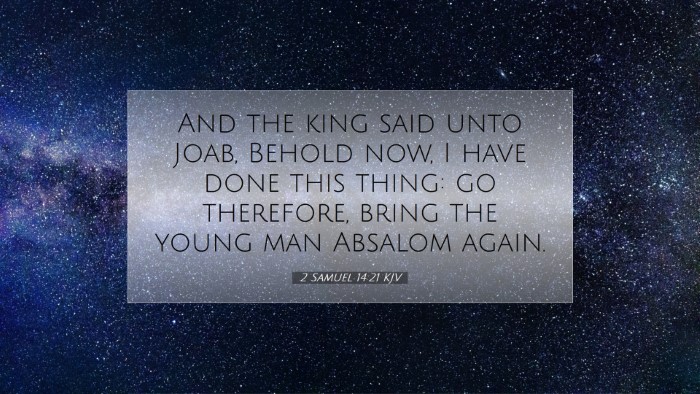Commentary on 2 Samuel 14:21
Verse: “And the king said unto Joab, Behold now, I have done this thing: go therefore, bring the young man Absalom again.”
Introduction
This verse represents a pivotal moment in the narrative of David's relationship with his son Absalom. It reflects not only David’s character as a father but also the complexities of leadership, reconciliation, and the consequences of sin. The insights from various public domain commentaries provide a rich understanding of this verse and its implications for pastoral ministry, theological study, and personal application.
Matthew Henry's Commentary
Matthew Henry emphasizes the theme of reconciliation in this passage. He notes that David's decision to allow Absalom to return to Jerusalem signifies a shift in his parental approach.
-
Parental Love: Henry highlights David’s enduring love for Absalom despite the latter’s rebellion and actions that had led to familial strife. This reminds us of God’s relentless love towards His children and the longing for reconciliation over punishment.
-
Leadership and Forgiveness: The decision to bring back Absalom suggests the importance of forgiveness in leadership. Henry draws parallels between David’s actions and the Christian call to forgive and restore relationships, stressing that effective leaders must navigate personal relationships with grace.
Albert Barnes' Insights
Albert Barnes provides a detailed exposition of the socio-political ramifications of David's decision. He notes how Joab's intervention initiates a complex scenario that affects the king’s authority and family dynamics.
-
The Role of Joab: Barnes notes that Joab, as David’s commander, played a crucial role in orchestrating Absalom’s return. This incident showcases Joab’s influence and the political maneuvering that often occurs within royal households. Pastors and leaders can reflect on how advisors can shape decisions that have far-reaching consequences.
-
Caution in Leadership: Barnes warns that David’s acceptance of Joab's manipulation indicates the potential dangers leaders face when they rely too heavily on advisors without seeking divine guidance. This serves as a reminder for spiritual leaders to constantly seek God’s wisdom in decision-making.
Adam Clarke's Perspective
Adam Clarke offers a theological reflection on this passage, particularly emphasizing the need for mercy and understanding in leadership roles.
-
Mercy over Justice: Clarke argues that David's choice to reconcile with Absalom is an embodiment of divine mercy. He encourages readers to consider how mercy should permeate their actions, particularly in church leadership and community relationships.
-
The Consequences of Rebellion: While advocating for forgiveness, Clarke also points out the consequences of Absalom’s past actions. He encourages believers to understand that while reconciliation is vital, it must be approached with recognition of past transgressions and a commitment to restoration rather than mere toleration of sin.
Theological Implications
This verse invites reflection on key theological concepts:
-
Divine Forgiveness: The narrative illustrates the larger theme of God’s desire to restore humanity. David's move towards reconciliation echoes God’s call to repentance and His joy when the lost are returned.
-
Complexity of Human Relationships: The interaction between David and Joab, as well as between David and Absalom, highlights the complexities inherent in human relationships, especially within the family and community of believers.
Application for Leaders and Believers
The account of David and Absalom provides practical lessons for leaders and believers alike:
-
Embrace Reconciliation: Like David, leaders are called to embrace reconciliation, fostering an environment where forgiveness is possible and relationships can be restored.
-
Seek God’s Guidance: The cautionary elements of this narrative remind leaders to seek God’s direction in their decision-making processes rather than relying solely on human wisdom.
-
Recognize the Need for Accountability: While mercy is essential, it must be paired with accountability, ensuring that those seeking reconciliation understand the gravity of their actions.
Conclusion
In conclusion, 2 Samuel 14:21 serves as a profound reminder of the complexities of familial relationships, the necessity of forgiveness, and the wisdom that must guide leaders in their decisions. The insights from Matthew Henry, Albert Barnes, and Adam Clarke collectively enrich our understanding, urging us to navigate these themes with both grace and awareness of the consequences of our actions.


